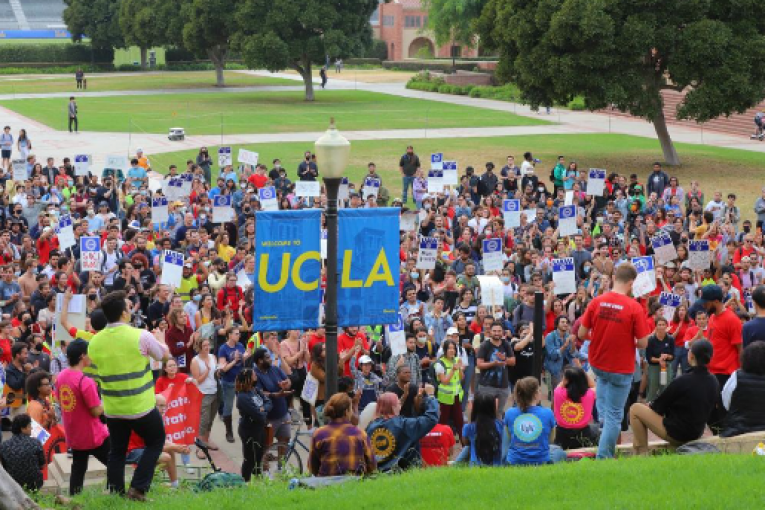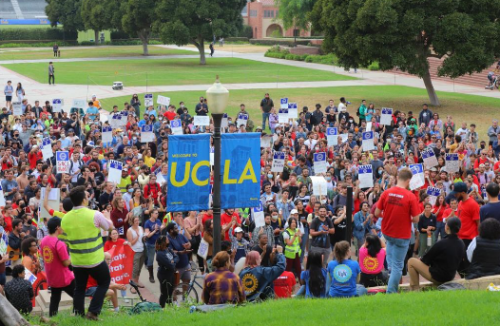

By Karis Kim
LOS ANGELES, CA—On Oct. 12, over 1300 graduate workers and researchers under UAW 2865 and UAW 5810 called for a strike authorization vote on Janss Steps at the University of California, Los Angeles (UCLA) against the insufficient salaries they receive in proportion to the work they perform.
The UAW (United Automobile, Aerospace and Agricultural Workers) is one of the oldest unions in the country and represents a variety of sectors from higher education to steel. UAW 2865, UAW 5810, and SRU-UAW are three smaller branches that are voting to strike.
The UAW 2865 consists of teaching assistants, teaching associates, instructors, graduates, and student researchers at the University of California, Los Angeles, while the UAW 5810 encompasses people from all the University of California campuses and includes post-doctorates, people from the sciences, and researchers. The SRU-UAW is a newly-formed branch of graduate student researchers.
While there are several issues the university needs to address, UAW 2865, UAW 5810, and SRU-UAW strongly press for higher wages and better conditions. They demand that the University upholds their initial promise of being “an engine of economic and social equity in our state.”
However, even after continuous and reasonable propositions, the UC has offered unaccommodating proposals, such as raises below inflation, and have repeatedly violated California labor laws.
The graduate workers are the backbone of the UC, but the university fails to support a compensation that allows reasonable living conditions. UAW 2865 also advocates for job security, support for parents and family, transit, international scholar rights, and more for graduate/academic workers.
Shannon Forest, one of the UCLA English Department strike captains under UAW 2865, described the situation as a simple math problem that the university hasn’t addressed.
She expressed her frustrations from the perspective of a PhD student and Instructor and explained that it is not possible to live on a Teaching Associate’s salary. She stated, “TAs in the humanities generally make 25K-29K a year, but the average rent for a one bedroom apartment in Westwood is around 2,500 dollars which is also around our monthly paycheck. The math just doesn’t add up.”
While university-provided graduate housing is slightly less than market-rate, it is still between $1,400-$1,800/month for a studio apartment; this is well over half a TAs monthly paycheck, placing them under extreme “rent burden”. Rent burden is defined as an individual spending 30% or more of their monthly paycheck on rent.
Furthermore, graduate workers have to consider other expenses, including transportation and food. And if workers decide to move to cheaper places, the cost of transportation increases due to the commute. Forest believes it is unfortunate how they “have to give up financial security to live for a passion.”
TAs, for example, spend 20+ hours a week teaching, grading, and preparing for teaching. The other 20 hours of their week is supposed to be spent doing their research, to total a “full time,” 40-hour work-week. Yet because TAs can’t afford to live on their salaries alone–which are defined as “extremely low income” for Los Angeles County by HUD (Department of Housing and Urban Development)–they often spend their research hours and personal time working second and third jobs. Many UCLA PhDs, then, find themselves in the top PhD programs in the country without any time to do the research they came to UCLA to do.
Enrique Olivares Pesante, the English Department’s head steward of UAW 2865 and a fourth-year PhD student, stated how if the university meets their demand of giving academic student employees and researchers a base pay of 4,000 dollars, “they won’t have to work two jobs and they can finally pay rent.”
Olivares Pesante described how the community of academic workers feels as they join together and protest. He stated, “It’s our university. It’s not an institution, it’s the people.” With one collective mind, they have been attempting to bargain with the university as one union, but the university has been bargaining in bad faith during contract negotiations.
When asked how UCLA undergraduates can be involved and help to support the protest, Olivares Pesante said to “respect the picket line and spread awareness. The university benefits from students not engaging with each other.”
According to Forest, talking to TAs about their workload, needs, and strike participation also helps the cause and is another way for students to be involved.
With the strike looming, undergraduates should be aware that they will be impacted by the disruption. Their teaching assistants might withhold labor (not responding to emails, etc.) and students should anticipate that their TAs will not attend lectures, hold discussion sections, or grade papers.
Teaching assistants are the ones who communicate with the students and manage online activity. However, Forest mentioned that if the university decides to “play ball” with the bargaining team and meet the union’s collective demands, the strike could be over in a day.
When asked for a final message, Forest said “if the university decides to respond to union demands, it is sending the message that it cares about its graduate students and values the essential labor they provide for the university. If not, it is saying that it doesn’t care that it pays us a wage that barely covers rent.”
Olivares Pesante expressed similar enthusiasm, and stated that “the fact that we believe in what we do is important for the new world we’re trying to create: a world fair for everyone. We are here to do that work. When we stand, we stand together!”
For more information or to get involved, click here.